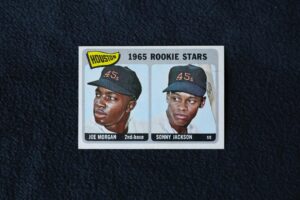It’s a sunny Saturday morning, and you’re at your local flea market. The scent of fresh popcorn wafts through the air, mingling with the excitement of treasure hunters browsing through eclectic stalls.
As you stroll past vintage comic books, retro video games, and antique furniture, something catches your eye. It’s a display brimming with vibrant sports cards, each one a portal to iconic moments and legendary athletes.
Memories of childhood collections flood your mind, and suddenly, you’re struck with an idea: what if you could turn this nostalgic hobby into a profitable venture?
Well, if you have the right information, you can! Let’s go through what to know about selling sports cards.
Vintage Card Resurgence
In recent years, there has been a notable resurgence in the popularity of vintage sports cards, captivating both long-time collectors and new enthusiasts.
Vintage cards, particularly those from the 1950s to the 1970s, are increasingly sought after on the sports cards market for their historical significance and nostalgic value.
These cards represent a golden era of sports, featuring iconic athletes who have left a lasting legacy in their respective fields.
One driving factor behind this resurgence is the scarcity and unique charm of vintage cards. Unlike modern cards, which are often produced in large quantities, vintage cards are limited in supply. Their rarity, combined with the allure of owning a piece of sports history, makes them highly desirable among collectors.
The distinct design and artwork of vintage cards, which often reflect the style and aesthetics of their time, add to their appeal. You can do research and figure out trending sports cards right now before you sell.
As people seek to reconnect with their past, collecting vintage sports cards offers a tangible way to relive and celebrate their favorite sports memories. This cultural shift towards valuing and preserving the past further drives the interest in vintage cards.
Player Performance
A player’s on-field achievements, career milestones, and overall impact on the game can significantly influence the desirability and price of their cards. Collectors and investors keenly monitor players’ performances, understanding that a stellar game or season can lead to a surge in demand for related sports cards.
When a player delivers an outstanding performance – whether it’s breaking a record, winning a major award, or leading their team to victory – their cards often see an immediate spike in value. This phenomenon is particularly pronounced with rookie cards or cards from pivotal moments in a player’s career.
For instance, a rookie card of a player who has just won the MVP award or secured a championship title can become highly coveted, with prices skyrocketing almost overnight.
In the current market, social media and sports news outlets shape perceptions of player performance. Highlights, viral moments, and media coverage can amplify a player’s visibility and influence card prices.
Engaging with these platforms allows collectors to stay ahead of trends and make better decisions when it comes to trends in top sports card sales.
Collecting The Set
A growing trend in the sports card market is the pursuit of set collecting, where collectors aim to complete specific series or sets of cards.
One of the main attractions of set collecting is the sense of accomplishment that comes with completing a set. Whether it’s a vintage set from the 1970s or a modern release, assembling all the cards in a series can be immensely rewarding.
This process often involves tracking down elusive cards, which adds an element of adventure and excitement to the hobby. Collectors take pride in showcasing a complete set, which can also increase the overall value of their collection.
The demand for certain sets can also drive market trends and card values. Some sets are renowned for their design, player lineup, or rarity, making them highly sought after.
Limited edition sets, anniversary editions, or sets featuring rookie cards of legendary players can command premium prices. Collectors often seek out these coveted sets, sometimes paying a significant amount to acquire the final pieces needed to complete their collection.
Understand Card Grading
Grading adds a layer of credibility and assurance for both buyers and sellers. When a card is professionally graded by reputable companies, it undergoes a thorough evaluation based on several criteria, including centering, corners, edges, and surface condition.
The result is a grade that reflects the card’s condition, usually on a scale from 1 to 10, with 10 being gem mint.
The grading process involves submitting your card to a grading company, where it will be examined by experts. They assess the card under magnification and high-intensity lighting, evaluating its physical attributes meticulously. Each aspect of the card is scrutinized.
Know the Cards You Have
Knowing the details and significance of each card can greatly enhance your ability to sell effectively and capitalize on market trends. Here are key steps to ensure you’re well-informed about your cards.
Many sports cards come in various editions and variations, such as base cards, parallels, inserts, and autographs. Base cards are the standard cards in a set, while parallels are similar but feature unique attributes like different colors, patterns, or serial numbering.
Inserts are special cards inserted into packs at lower rates, often featuring unique designs or themes. Autographed cards and memorabilia cards, which include a player’s signature or a piece of game-used equipment, are highly sought after and typically more valuable.
Keep a detailed inventory of your collection. Document each card’s details, including player name, year, set, condition, and any notable features or variations.
This can help you track your collection, identify duplicates, and make informed decisions about which cards to sell or hold. An organized inventory also makes it easier to respond to potential buyers’ inquiries quickly and accurately.
Selling Sports Cards: Start Today
There’s so much to think about when you’re selling sports cards. With these tips and trends, you should be able to start making money off your collection.
Are you ready to sell your collection? Mark Rubin of American Legends has been in the business for over 40 years, and in that time, he’s built a strong reputation for honesty and success.
Get in touch today to get started.


